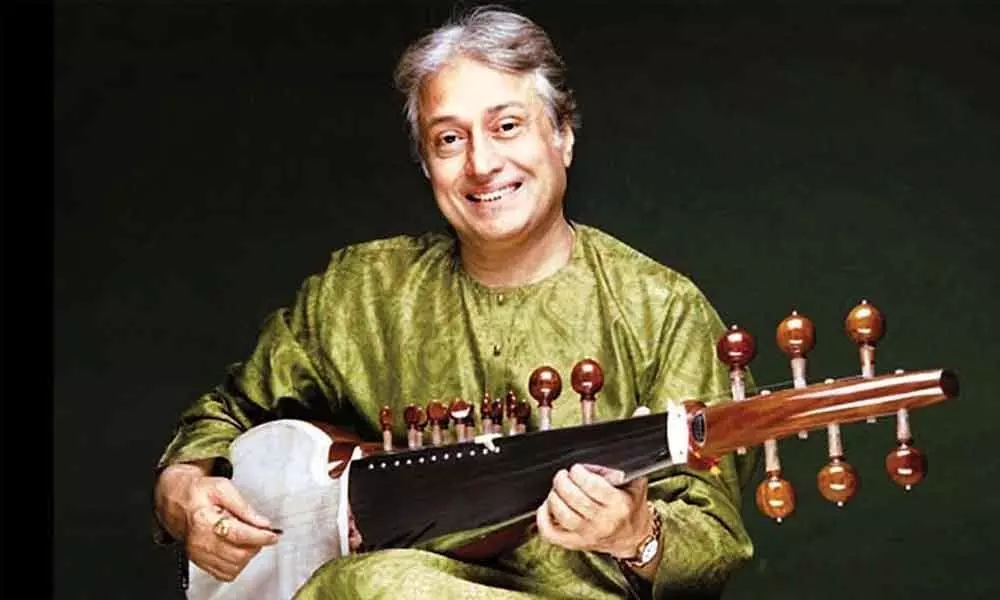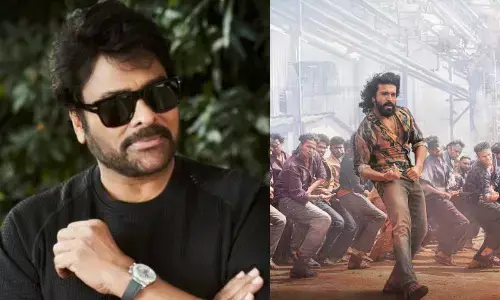Of melody and malaise in the world

Just back from touring the US with his sons, Sarod maestro Ustad Amjad Ali Khan, who performed at a synagogue, a church, besides delivering a lecture at a university there says that violence seeping in every society in the world is what disturbs him the most.
Just back from touring the US with his sons, Sarod maestro Ustad Amjad Ali Khan, who performed at a synagogue, a church, besides delivering a lecture at a university there says that violence seeping in every society in the world is what disturbs him the most.
"I talked about that in my lecture and stressed that the reason it was happening was the fact that we had stopped respecting every other religion except the one we followed.
Sadly, this violence is not limited to those who have never had access to education. What can be more shocking than witnessing a PhD degree holder talking like a fundamentalist?
That makes you wonder at the quality of education being imparted. It is after all the flavour of diversity that makes this country so enigmatic," Khan told this writer.
Stating that it was heartening to see several promising young musicians making a mark for themselves in the classical arena and that the world now boasted of more than 500 Sarod players, the maestro, who will be performing during the three-day 'Delhi Classical Music Festival' to be organised by The Art, Culture & Language Department of the Delhi government from November 23, adds that they have been much fortunate considering the kind of facilities they have, which his generation never did.
"There is a huge archive in CDs, recordings and videos. No matter who their teacher is, they can now copy anyone," he laughs.
He however points that huge dependence on social media for promotion by young musician has led to a peculiar situation.
"Everyone seems to be saying - 'I am the best', the lihaz has simply vanished.
What is more shocking is the fact that some have started calling themselves 'Ustad' or 'Pandit'. They forget the fact that these titles are given by people out of sheer love and respect.
One is not supposed to address oneself like that. They must understand that, only media management does not work. You have to have the sur, your music has to be appealing," says the musician whose card and letterhead find no mention of any titles or the awards he has won.
"All awards are special, but the one closest to my heart is the 'Sarod Samrat' given by 'Prayag Sangeet Samiti' at the age of 15. It meant so much more responsibility," says this recipient of the Padma Vibhushan honour.
Not really a fan of the growing number of talent shows on television, the ustad points that young children being forced to perform by their parents on such platforms only means that their training would be stunted.
"Parents just want to push their children towards instant glamour and publicity through these shows. If he/she is talented, they take the next opportunity to take him there.
In their ambition, they forget the fact that in most cases we don't even know of what becomes of the winner of such a show after a year.
Sadly, there are very few people who are studying music to understand it. For most, it is nothing more than a platform-they just want fame."
A believer in the age-old Guru Shishya Parampara, Khan says that the top 10 best-known classical musicians in the country have been trained under this tradition.
"There was a time when a knowledgeable person used to be considered an institution. Now, a building made of concrete is. For around 70 years now, successive governments have been spending crores as grants towards music institutions across the country.
The time has now come to look if these places have produced any major musician. What is happening with all that money?"
Believing that in order to encourage classical music, the state needs to start recognising talented musicians early only, he adds, "Why wait for them to attain the age of 60? Like sportspersons, the government needs to bring musicians under the spotlight in their 20's."
At present working on his autobiography, Khan, who, along with his sons recently performed with the New York based Refugee Orchestra Project says it's surprising that even decades after independence, India does not have an orchestra.
"We have never realised the importance of collective, it's not really in our DNA. Here, everyone wants to be a solitary hero. We have such excellent musicians, but the moment they get together, you can't even imagine the kind of ego clashes that happen."
Pleased that the corporate sector in India was coming forth and extending support to classical music, Khan, who is working on his autobiography, adds, "They have demonstrated much respect towards our traditions and culture by organising and supporting several new festivals."
As the conversation veers towards Spic Macay, which for more than 40 years has been exposing school and college students to Indian classical music, the musician stresses that now the time had come to actually ask the students who they wanted to listen to.
"I firmly believe that music must not be imposed. Why not try to understand what the children want? Also, it is important that they be acquainted with the great western masters like Beethoven, Bach, Mozart and Tchaikovsky. Giving them music which they want to listen to will prove to be healthier."









